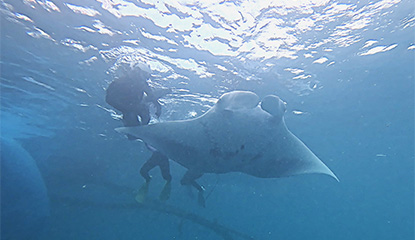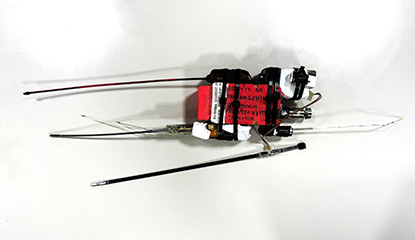MENU
- Home
- Okinawa Churashima Foundation Research Institute
- Studies of Marine Animals
- Research activity report
- Monitoring body temperature and behavior of an Alfred manta: Revealing ecology with the latest technology

Research on marine organisms
Monitoring body temperature and behavior of an Alfred manta: Revealing ecology with the latest technology
The Okinawa Churaumi Aquarium has begun field research to better understand Alfred manta behavior and physiology in natural conditions. This facility has reared this species for many years, and made discoveries about their sexual maturation※1 and reproduction※2. To research Alfred mantas in the wild, we attached a behavior monitoring device to an individual to record its swim speed and acceleration, plus the water depth and water temperature. An attached thermometer allows us to study how they maintain their body temperature when diving in cold deep waters. By comparing with our previous survey※3 on whale sharks, our goal is that through monitoring the behavior and physiological conditions of manta rays, we can gain understanding and help shed light on the ecology and conservation of this species.

The Alfred manta being studied
Recording device attached to the manta ray
Past research achievements
※1 Nozu R, Murakumo K, Matsumoto R, Matsumoto Y, Yano N, Nakamura M, Yanagisawa M, Ueda K, Sato K. 2017. High-resolution monitoring from birth to sexual maturity of a male reef manta ray, Mobula alfredi, held in captivity for 7 years: changes in external morphology, behavior, and steroid hormones levels. BMC Zool. 2(14).
※2 Murakumo K, Matsumoto R, Tomita T, Matsumoto Y, Ueda K. 2020. The power of ultrasound: observation of nearly the entire gestation and embryonic developmental process of captive reef manta rays (Mobula alfredi). Fishery Bulletin. 118: 1–7.
※3 Nakamura I, Matsumoto R, Sato K. 2020. Body temperature stability in the whale shark, the world's largest fish. Journal of Experimental Biology. 223 (11): jeb210286.
Copyright (c) 2015 Okinawa Churashima Foundation. All right reserved.

